Best pool test kit: keep your pool in perfect condition all year long
Our list of the very best pool test kits will ensure your pool chemicals are always perfectly balanced
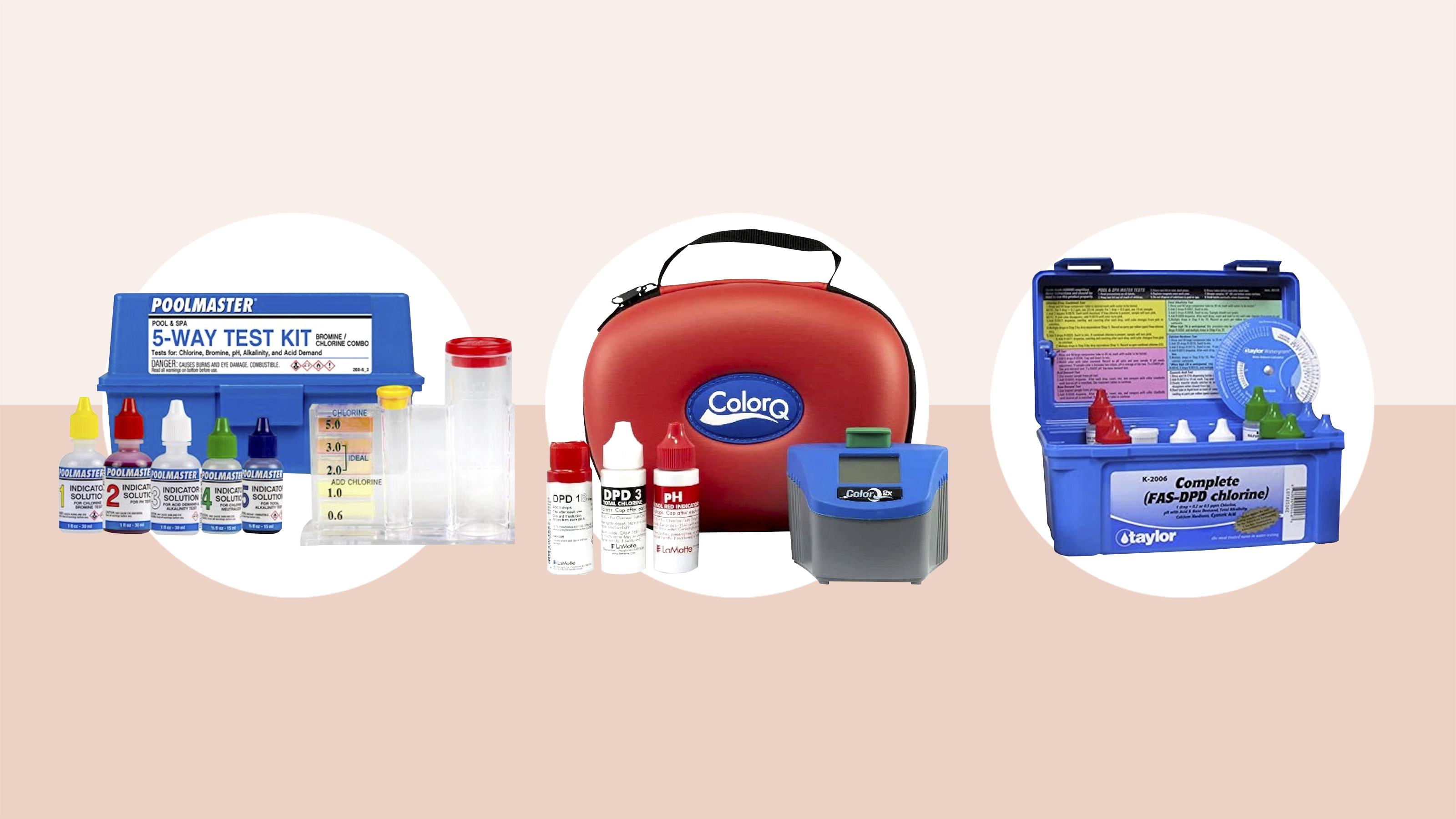

With the best pool test kit, maintaining your pool doesn't have to feel like a chore. Testing your pool chemistry regularly and adjusting it to make sure it’s safe for swimming is an essential part of owning a pool – the chlorine and PH need testing two or three times each week! So having the right tools for the job means you can spend more time enjoying your pool and less time looking after it.
When your pool chemistry is off, it can cause all kinds of problems. Too much calcium or the wrong PH level can make your pool water too hard which can destroy your pipes, filters or pool liner. Too much cyanuric acid prevents chlorine from killing bacteria which could be dangerous if it's not corrected. Too little chlorine allows algae and bacteria to grow, too much can irritate your skin and even turn your hair green.
Purchasing the right test kit for your above-ground pool can be challenging. Some kits are hard to read, or easy to contaminate, or use reagents that expire too quickly. Then there are different types of pool test kits; liquid, digital or strips. Different chemicals and metals need to be tested for more or less regularly, and it all depends on how often you’re swimming too.
At the least, you’ll want to test chlorine, free chlorine, pH, and alkalinity levels regularly. This can be a lot of work if you have different tests for each chemical. But a pool test kit makes it easy, as you use the same method across the board. We would recommend you purchase a kit that tests for all of these plus some extras like cyanuric acid and calcium hardness too. Rest assured all of our favorite test kits listed below have got it covered.
Best pool test kit 2022
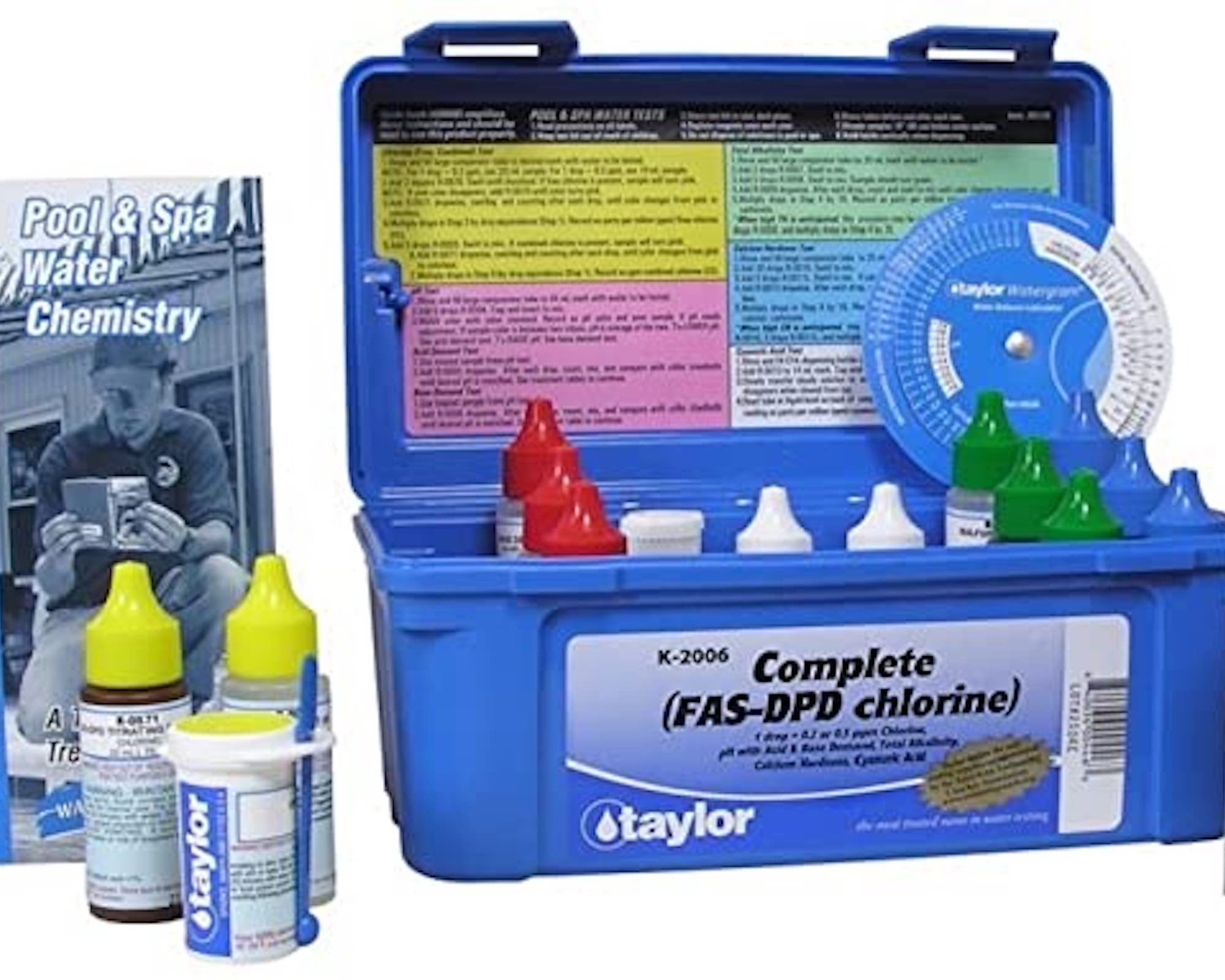
1. Taylor Technologies Inc. K-2006 Test Kit Comp Chlorine FAS-DPD
Specifications
Reasons to buy
Reasons to avoid
This liquid test kit may cost more than strips, but it is worth the investment for easy pool maintenance. The readings are super accurate. If you have been using test strips and find that you’re still having issues with cloudy water, red eyes, or algae, it is time to make the switch.
It's also a very thorough test kit that tests for chlorine, free chlorine, pH, acid and base, alkalinity, calcium hardness and cyanuric acid. This is much more than other, less expensive kits. It doesn't test for phosphates and metals, which you may need to test for occasionally, but otherwise it has everything you need. As long as you keep these chemicals in balance, there shouldn’t be any major issues.
There is an initial learning curve, but once you have run the tests a few times you can do it quickly and easily. The testing directions are clear and the bottles are color-coded, so it is simple to follow.
We love that they put the test instructions on the lid of the carry case so you can’t lose them. It also comes with a comprehensive booklet which tells you all you need to know about your pools chemistry. And a watergram wheel which shows you the saturation index indicating whether the water could be corroding your pool equipment or depositing scale. The booklet and watergram are water resistant too, which is handy as we sometimes get pool water everywhere.
The downsides are that this kit is more expensive than test strips and some of the other liquid test kits on the market. Most of the reagents expire after around a year too, so you’ll need to purchase new ones each pool season. However, if you want to swim in crystal clear water all summer long, this test kit is well worth the investment.
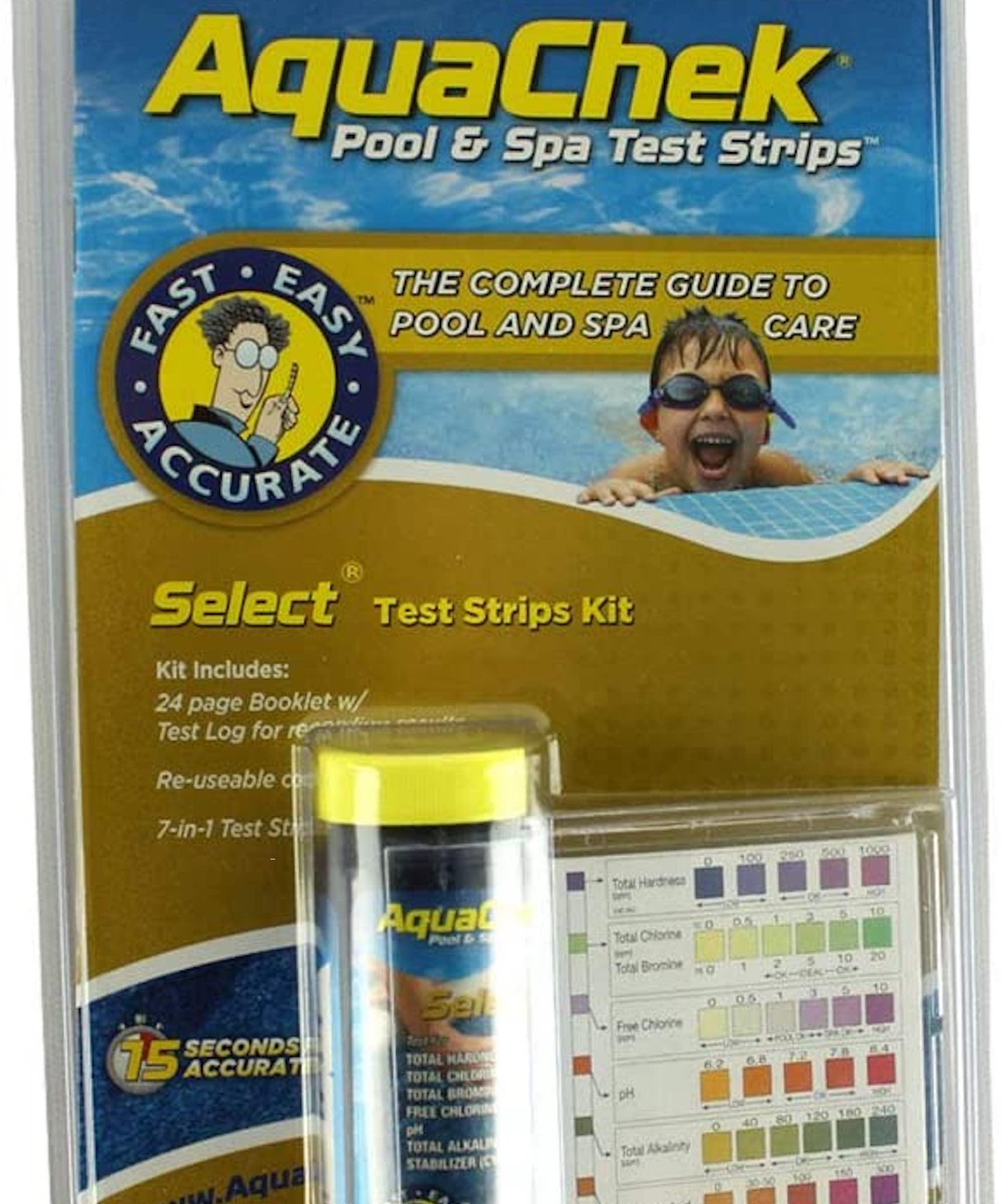
2. AquaChek Pool 7-in-1 Test Strips Kit (2-Pack)
Specifications
Reasons to buy
Reasons to avoid
If our top choice is a little too chemistry class for your liking, these AquaChek Pool 7-in-1 Test Strips are for you. They are so simple to use. There is no need to take any water samples or to add any reagents. You just dip the strip straight into the pool, wait 30 seconds and read the results. It’s so easy.
These test strips are also very comprehensive. They test for chlorine, free chlorine, bromine, calcium hardness, alkalinity, pH and cyanuric acid. You don’t need to purchase different strips to test for different chemicals, it’s all in one.
The kit also comes with a detailed booklet on pool chemistry, so you know what your readings mean and what to do with them. The guide is beginner friendly and easy to understand.
The AquaChek test strips are great value for money. They come with 50 strips and everything you need to read and assess your pools chemistry. This 2-pack from Home Depot is a real bargain, 100 test strips for under $40 bucks.
The big drawback is that pool test strips are renowned for giving inaccurate readings. They can easily be contaminated if you touch the testing part of the strip, or leave them out, or don’t dunk them deep enough, or breathe on them too heavily.
The Aquachek test strips do come in an air tight container to prevent contamination, but you still need to careful. And then you have to compare the test strip to a color chart to find the corresponding numbers, which leaves even more room for error. You can purchase the Aqua Check TruTest Digital Pool Test Strip Reader to get a more accurate interpretation.
Overall, the Aquachek 541604A Select Kit Test Strips are a comprehensive, simple and budget-friendly option. They are not the most accurate testing kit on our list, but they will do just fine for the swimming pool hobbyist. If your pool sees heavy use or if you want to go pro, then you may want to splash out on our top choice instead.
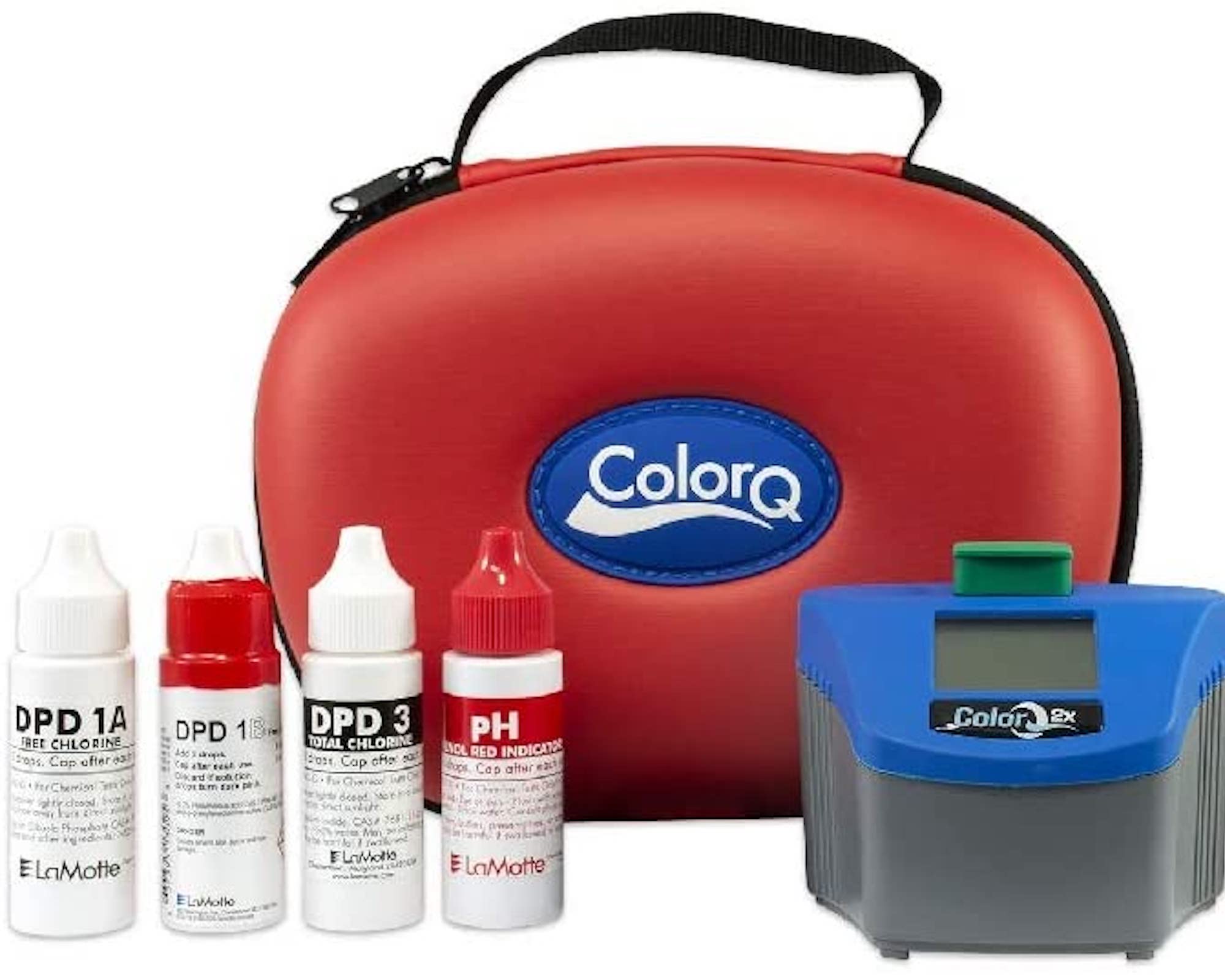
3. LaMotte ColorQ 2X PRO 7 2nd Generation
Specifications
Reasons to buy
Reasons to avoid
If you are looking for a professional grade pool test kit, the LaMotte ColorQ 2x Pro 7 is the pick for you. This high end option only misses out on the top spot as it is substantially more expensive than other test kits on the market.
The main appeal of the LaMotte test kit is that it is super accurate. There is no need to do your own color matching against a chart, so there is less room for error. The digital photometer reads the result for you and displays it on the screen.
The LaMotte ColorQ 2x Pro 7 is very comprehensive. It tests for chlorine, free chlorine, bromine, pH, alkalinity, calcium hardness and cyanuric acid. There's also a Pro 9 available if you want to get even more into it.
The downside is that you do still have to take water samples and apply the reagent, so it is more effort than test strips. That said, it is simpler than the Taylor Technologies K-2006, as most of the tests are just five drops of reagent and the digital reader does the rest. The kit also comes with detailed instructions on how to carry out the tests and what the results mean.
The 2nd generation of the LaMotte ColorQ Pro 7 has Bluetooth so you can send results to yourself, rather than having to write it down. The digital photometer is also waterproof in this new model which is an excellent improvement. It comes with a sturdy carry case and with color coded bottle caps to make testing even easier.
Overall, this is a superb test kit that essentially removes the potential for misinterpretation of results. However, this comes with a premium price tag. If you use your pool heavily year round, it’s probably worth the investment. But if you use it a few times each summer, you probably don’t need this level of accuracy, or features like Bluetooth in your test kit.

4. Poolmaster 5-Way Deluxe Test Kit with Case
Specifications
Reasons to buy
Reasons to avoid
If the LaMotte ColorQ 2x Pro is a little too extravagant for your budget, try the Poolmaster 5-Way Deluxe Test Kit. This quintessential liquid test kit is great value for money.
The reagents also tend to last longer than those that come with our number one choice, the Taylor Technologies K-2006, making it even better value. It comes with 1 oz. bottles of the three reagents you use the most and ½ oz. bottles of the other two. Smart.
Again, if you are used to using test strips, there is a bit of a learning curve but once you have used this test kit a couple of times it's quick and easy. The instructions are simple to follow, the carry case is well organized and intuitive and the bottles are numbered. You simply test for each agent in order, bottles 1 through 5, and match the color of the sample to the colored panels on the test container to get your result. There's some room for error in the interpretation of the results, but the chart is clear and easy to read.
The downside is that this kit isn’t as comprehensive as our top choice, the Taylor Technologies K-2006 test kit, but it still covers the basics. It tests for chlorine, bromine, pH, acid demand, and total alkalinity. As long as you regularly keep all of these chemicals in check, your pool water should be safe for swimming, but you may want to use additional tests on occasion for other agents too.
This kit is perfect for most backyard pool owners. It's affordable, it covers most of the tests you need and the results are more accurate than test strips.
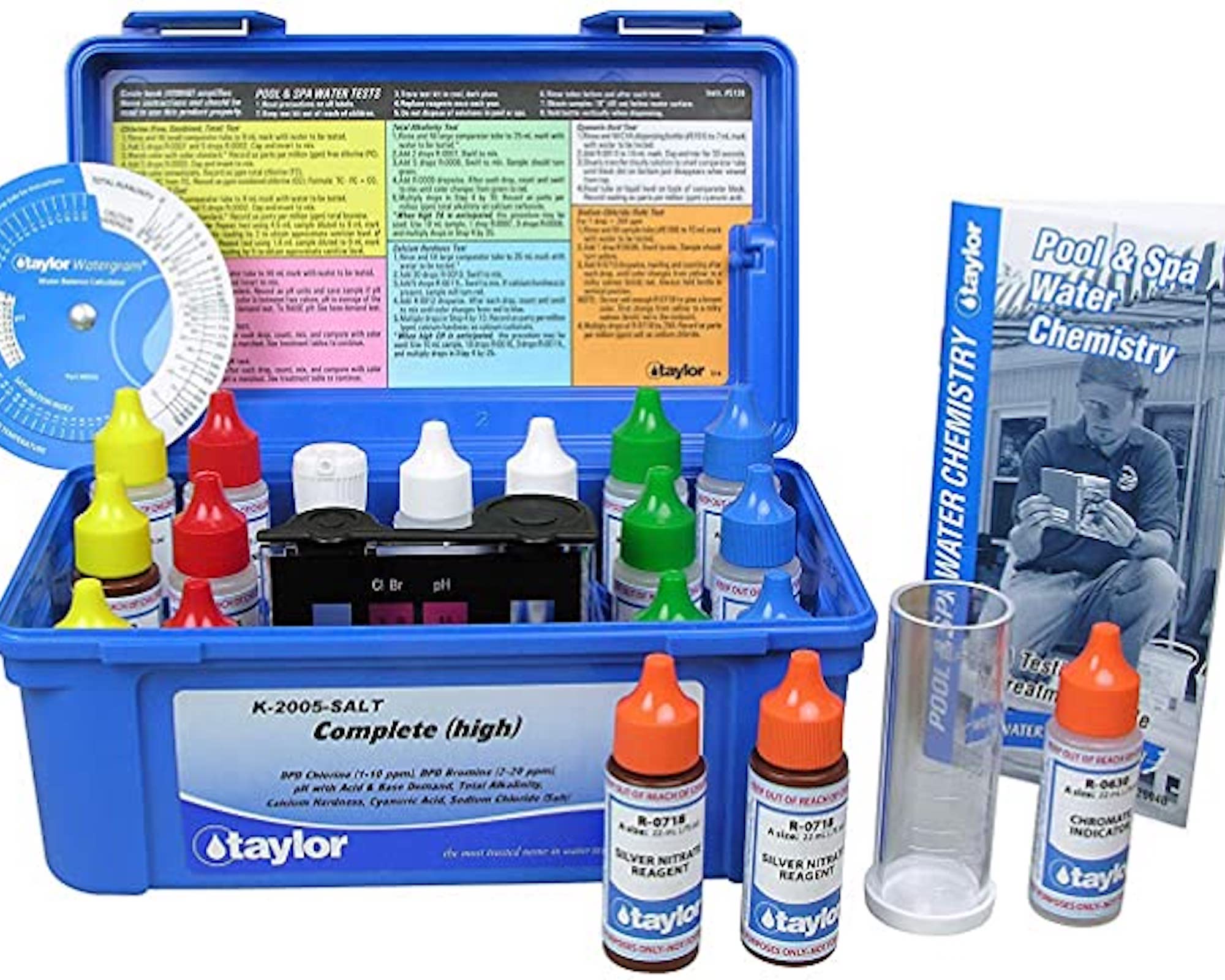
5. Taylor Technologies K-2005-SALT Test Kit Complete High
Specifications
Reasons to buy
Reasons to avoid
If you have a saltwater pool, you can purchase additional reagents to measure the salinity level in your pool water as well as using one of the test kits above. Or, get yourself a super convenient all-in-one test kit like the Taylor Technologies K-2005-SALT Test Kit. It's designed specifically for saltwater pools and includes everything you need.
This test kit is very thorough. It tests for the same agents as our top pick from Taylor Technologies; chlorine, PH, acid and base, alkalinity, calcium hardness, and cyanuric acid, plus salinity too. And it’s all packaged in one convenient, organized carry case.
The bottles are color coded and instructions are clear and easy to follow. As with our number one choice, they put the test instructions on the lid of the carry case so you always have them when you need them. This kit also comes with the booklet all about your pools chemistry to help you interpret the results, as well as a watergram wheel which shows you the saturation index.
The main drawbacks are that it's more expensive than test strips and the tests take longer to carry out. As with all liquid test kits, there is also room for interpretation with the results.
Overall however, this liquid test kit will give you more accurate results than test strips and it tests for salinity. If you have a saltwater pool, I’d recommend making the purchase.
Things to consider when choosing the best pool test kit
Before making your final choice from our selection of the best pool test kits available, there are some additional factors you may want to consider:
Type of test kit
As you can see from our top picks, there are three different types of pool test kits: strips, liquid and digital.
- Test strips: These are by far the easiest to use. If you purchase comprehensive test strips like the Aquachek ones in this list, then you simply dip one strip into your pool to test for a whole range of chemicals. However, these strips are often inaccurate.
- Liquid tests: If you want to get a more accurate reading, try a liquid test. These do take a little more effort as you have to take a water sample from your pool and add drops of different reagents to test for different chemicals. With both liquid tests and test strips, you check the colors on the strip or in the container and match them up with colors on a chart to determine levels. This leaves room for misinterpretation.
- Digital pool testing kits: These are the most accurate but come with a premium price tag. You have to carry out a liquid test, but then a digital photometer reads the result for you and displays it digitally.
Once you've chosen the right pool test kit for your needs, it's also worth investing in the best pool shock and best pool vacuum to ensure you have all of your pool maintenance needs covered for the duration of the swimming season.
Type of swimming pool
If you have a saltwater pool you'll need to check the salinity as well as the chlorine levels, pH level, total alkalinity etc. You can purchase tests for salinity separately or purchase a kit that includes these tests like the saltwater test kit for Taylor Technologies in our list above.
Chlorine or bromine pools can use the same test kits as both chemicals can be tested with the same reagent, orthotolidine. We would recommend purchasing a comprehensive test kit like the ones listed here. It's much easier to keep all the tests together in one case and to have all the information in one booklet.
If you have one of the best hot tubs in your yard, you may be wondering if this list of the best pool test kit applies to you too. Yes, it sure does. All of the pool test kits listed here would also be perfect for using as part of your essential hot tub maintenance.
Budget
When deciding on the best pool test kit for you the other major thing to consider is budget. The average pool user doesn’t really need a digital test kit with Bluetooth to send results to their phone.
If you use your pool for a few months each year, a liquid test kit is likely more than accurate enough. Or if you use your pool sporadically, test strips may well do the trick. Try starting with the less expensive options on this list and upgrading should you find your pool chemistry is off balance.
What levels are ideal?
All of the kits listed here come with detailed information on the perfect balanced pool chemistry. However, if you are curious, these are the ranges you should be aiming for:
- PH: 7.4 – 7.6
- Chlorine: 1.0 – 3.0 ppm
- Alkalinity: 80 – 140 ppm
- Calcium Hardness: 200 – 400
- Cyanuric Acid: 25 – 50 ppm

Emily Grant is a British ex-pat living in Squamish, Canada. She has written about all sorts from interior design and gardening, to travel, tourism, and pets. When she’s not writing, she loves finding DIY ways to beautify her rented space. She also loves spending time out in the backyard, relaxing in the hammock on her beautiful patio. In addition to Gardeningetc, her work has featured on Real Homes and Homes & Gardens.
